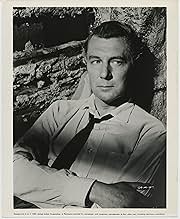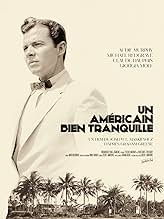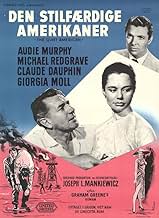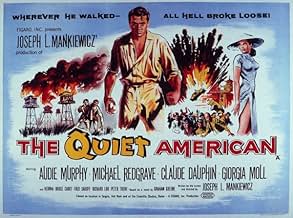VALUTAZIONE IMDb
6,6/10
2233
LA TUA VALUTAZIONE
Un giovane americano ingenuo e un cinico diplomatico britannico più anziano non sono d'accordo sulla politica nel Vietnam del 1952 e su una bella giovane ragazza nativa.Un giovane americano ingenuo e un cinico diplomatico britannico più anziano non sono d'accordo sulla politica nel Vietnam del 1952 e su una bella giovane ragazza nativa.Un giovane americano ingenuo e un cinico diplomatico britannico più anziano non sono d'accordo sulla politica nel Vietnam del 1952 e su una bella giovane ragazza nativa.
- Regia
- Sceneggiatura
- Star
- Premi
- 1 candidatura in totale
Georges Bréhat
- French Colonel
- (as Georges Brehat)
Vo Doan Chau
- Cao-Dai Commandant
- (non citato nei titoli originali)
Le Van Le
- Cao-Dai Pope's Deputy
- (non citato nei titoli originali)
Cho Cha Lung
- Hotel Waiter
- (non citato nei titoli originali)
Recensioni in evidenza
I loved the Graham Greene novel. I admit I picked it up secretly from my father's library when I was 15. It stayed with me. I knew about the existence of this 1958 version written and directed by Joseph L Mankiewicz but I had never seen it until now, thank you TCM. I had seen the 2002 with a terrific Michael Caine but the film - a more faithful version of Greene's novel according to the critics and it may be true but the 2002 version left me pleased but unmoved while the 1958 version is much more unsettling, in spite of some hard to understand choices by the filmmakers. Audie Murphy plays the quiet American, and he is, very quiet. Good looking a real life American war hero but he is not an actor and here he is sharing the frame with Michael Redgrave. Michael Redgrave! The other oddity is the casting of Italian Actress Giorgia Moll as the Vietnamese girl-in-the-middle. She's lovely but I repeat, she's Italian. No, the power force here is Michael Redgrave, A marvelous, fearless performance and that alone makes The Quiet American an absolute must.
Audie Murphy is wooden in his portrayal of the American and, in a twist to the novel, is the hero of the piece. Not quite what Greene had in mind but relevant to events in the USA during the McCarthy era when this film was made (1958).
Phuong has not been given the importance she demands in the novel. The way in which she is 'colonised' by first Fowler and then the American (Pyle in the novel, but not named in this film) is a comment on the way in which the foreign landscape is depicted and also on how the country has been colonised. Despite this she is also manipulative.
However, having said some negative things about this production of The Quiet American, it is a MUST view for the portrayal of tensions in the cold war era and the USA's twist to events as they unfold. Remember that Audie Murphy and Joseph L. Mankiewicz testified for HUAC against their fellow actors and colleagues at the height of McCarthyism.
This film is totally relevant to events unfolding today and for all those interested in the effects of colonialism and the rise of the Vietnam War. What is interesting about this film is the different take on events portrayed in Greene's superb novel, unfortunately, some of which were omitted or subverted in the 1958 film.
This film should be followed by the Philip Noyce version of The Quiet American (2001) with Michael Caine as Thomas Fowler and Brendan Fraser as Pyle (the American in the Mankiewicz version). There is a good opportunity to contrast and compare the two versions which are very different, given that the Noyce Quiet American is closer to the novel.
I would also recommend for light relief that viewers watch the Mash Season 2 TV series in which we see Colonel Flag of the CIA raising a few loud laughs.
Phuong has not been given the importance she demands in the novel. The way in which she is 'colonised' by first Fowler and then the American (Pyle in the novel, but not named in this film) is a comment on the way in which the foreign landscape is depicted and also on how the country has been colonised. Despite this she is also manipulative.
However, having said some negative things about this production of The Quiet American, it is a MUST view for the portrayal of tensions in the cold war era and the USA's twist to events as they unfold. Remember that Audie Murphy and Joseph L. Mankiewicz testified for HUAC against their fellow actors and colleagues at the height of McCarthyism.
This film is totally relevant to events unfolding today and for all those interested in the effects of colonialism and the rise of the Vietnam War. What is interesting about this film is the different take on events portrayed in Greene's superb novel, unfortunately, some of which were omitted or subverted in the 1958 film.
This film should be followed by the Philip Noyce version of The Quiet American (2001) with Michael Caine as Thomas Fowler and Brendan Fraser as Pyle (the American in the Mankiewicz version). There is a good opportunity to contrast and compare the two versions which are very different, given that the Noyce Quiet American is closer to the novel.
I would also recommend for light relief that viewers watch the Mash Season 2 TV series in which we see Colonel Flag of the CIA raising a few loud laughs.
The Quiet American (1958)
I think this is an extraordinary film. At the time, Americans didn't like it because it made them look bad, and the writer of the book it is based on, Graham Greene, didn't like it because it changed too much of his anti-American plot. But as a film, whatever its blurring of truth to history, is true about human nature. The credit for this goes not only to Greene, the enormously gifted writer and co-screenwriter, but also to the director, one of the lesser known American masters at telling a romantic story, Joseph L. Mankiewicz, who also helped with the screenplay.
The two are a perfect match, really, because both are all about subtlety and observation. Greene in particular has a way of bringing up the biggest issues in the most intimate and delicate ways, never grandiose, always psychologically sharp. And that is carried forward here in Vietnam a decade before the American War of the 1960s. The Communists are already fighting in the north, the French are getting ready to abandon the country to the Americans, and a British reporter is the center of our attention, not quite on anyone's side.
There are two key characters, the reporter played with astonishing depth and acumen by Michael Redgrave, and "the American", played toward a caricature by Audie Murphy, with enough twists to his character to avoid over-stereotyping.
Greene's observations of American do-good naiveté are fascinating, and the way this gets mixed (poisoned) with American meddling and military subversion is way ahead of its time. Or is it? It might be simply observant of the facts in 1950s Vietnam. Greene was a reporter himself there then, and after this book was published he was followed by American Intelligence until his death in 1991. One of the brilliant aspects of this movie is how it is not simply a love story, but has a trenchant, disturbing comment to make about world affairs, from the inside.
Still, love intrudes, and the crossed loves of the two men for the same young Vietnamese woman is less clichéd than you might expect. The story is moving without being sentimental. And all of this is layered up with the actual Imperialist/Colonialist facts of the time. The conflicting sides of a war that few really understood (it seems) until twenty years later are here in their full formed germinations. Unlike the Michael Caine version of the same story (from 2002), this one was made before history had unfolded. It's endlessly almost chillingly fascinating, even though Greene's anti-war (and somewhat anti-American) tone was largely removed. The later movie might be closer to the book, but it feels like a movie made about history, not one that predicts it.
There are some scenes here, priceless ones, shot in Vietnam in 1958, the rest is done (with terrific light and set design) in an Italian film studio. Greene was British and the production Italian, but Mankiewicz was American, and fully steeped in American filmmaking and myth making. It's this last aspect that is key--the movie is made to the highest standards of 1940s American melodramas, even having an echo (in terms of light and drama and style) of William Wyler's "The Letter" also set in Southeast Asia. The filming is astonishing--the photography is in the hands of Robert Krasker, who shot "The Third Man" and "Brief Encounter" to give you an idea of the moody richness of his style.
And as a melodrama it comes down to the crumbling personal world of Fowler. At the end, in the busy night streets of a chaotic Saigon, he says, "I wish there was someone to whom I could say I'm sorry." I found it the final moving, beautiful strain of truth and pathos in a very special movie.
I think this is an extraordinary film. At the time, Americans didn't like it because it made them look bad, and the writer of the book it is based on, Graham Greene, didn't like it because it changed too much of his anti-American plot. But as a film, whatever its blurring of truth to history, is true about human nature. The credit for this goes not only to Greene, the enormously gifted writer and co-screenwriter, but also to the director, one of the lesser known American masters at telling a romantic story, Joseph L. Mankiewicz, who also helped with the screenplay.
The two are a perfect match, really, because both are all about subtlety and observation. Greene in particular has a way of bringing up the biggest issues in the most intimate and delicate ways, never grandiose, always psychologically sharp. And that is carried forward here in Vietnam a decade before the American War of the 1960s. The Communists are already fighting in the north, the French are getting ready to abandon the country to the Americans, and a British reporter is the center of our attention, not quite on anyone's side.
There are two key characters, the reporter played with astonishing depth and acumen by Michael Redgrave, and "the American", played toward a caricature by Audie Murphy, with enough twists to his character to avoid over-stereotyping.
Greene's observations of American do-good naiveté are fascinating, and the way this gets mixed (poisoned) with American meddling and military subversion is way ahead of its time. Or is it? It might be simply observant of the facts in 1950s Vietnam. Greene was a reporter himself there then, and after this book was published he was followed by American Intelligence until his death in 1991. One of the brilliant aspects of this movie is how it is not simply a love story, but has a trenchant, disturbing comment to make about world affairs, from the inside.
Still, love intrudes, and the crossed loves of the two men for the same young Vietnamese woman is less clichéd than you might expect. The story is moving without being sentimental. And all of this is layered up with the actual Imperialist/Colonialist facts of the time. The conflicting sides of a war that few really understood (it seems) until twenty years later are here in their full formed germinations. Unlike the Michael Caine version of the same story (from 2002), this one was made before history had unfolded. It's endlessly almost chillingly fascinating, even though Greene's anti-war (and somewhat anti-American) tone was largely removed. The later movie might be closer to the book, but it feels like a movie made about history, not one that predicts it.
There are some scenes here, priceless ones, shot in Vietnam in 1958, the rest is done (with terrific light and set design) in an Italian film studio. Greene was British and the production Italian, but Mankiewicz was American, and fully steeped in American filmmaking and myth making. It's this last aspect that is key--the movie is made to the highest standards of 1940s American melodramas, even having an echo (in terms of light and drama and style) of William Wyler's "The Letter" also set in Southeast Asia. The filming is astonishing--the photography is in the hands of Robert Krasker, who shot "The Third Man" and "Brief Encounter" to give you an idea of the moody richness of his style.
And as a melodrama it comes down to the crumbling personal world of Fowler. At the end, in the busy night streets of a chaotic Saigon, he says, "I wish there was someone to whom I could say I'm sorry." I found it the final moving, beautiful strain of truth and pathos in a very special movie.
10yostwl
Graham Greene did not have a comfortable vision of the world--or at least of the activities of human beings in the world. While very few movies do justice to books on which they are based, the Quiet American is a chilling forewarning of what the United States would be letting itself in for in the years to come. Murphy, always an appealing figure on the screen but not noted for truly great acting depth and breadth, is ideal for this understated role. A very well done thriller which addresses racism, colonialism, various "economic"isms, all the while focusing on the individual human impacts of high level decision-making. Are we just pawns, forced into just following orders, or do we have the responsibility to take action on the side of what we know to be right, in spite of the personal cost?
Graham Greene drew upon his experience as a war reporter in French Indochina to write his novel on which this film is based. He was severely criticised to put it mildly for supposed anti-Americanism in the character of Alden Pyle, an undercover CIA agent. Following the Hollywood blacklistings, 'politics' dictated that Joseph L. Mankiewicz's version should show this 'quiet American' as a character motivated by altruism rather than by a political agenda. However the notion that America is a beacon of morality is no less laughable now than it was then. On the films release Mankiewicz was in turn attacked by Europeans for betraying the books intentions and making it pro-American. Graham Greene of course disowned the film entirely.
In this the American, who has no name, is played by Audie Murphy, far from being a great actor but whose wholesome persona suits the way the part is written and whose sterling War record would presumably improve the films box office potential.
As Phuong, the Vietnamese girl loved by both the American and Fowler the journalist, Mankiewicz cast Georgia Moll, an Italian. Her casting has raised a few eyebrows and would now be considered by the PC brigade to be decidedly 'non-inclusive'. She is however both touching and appealing in the role. Mention must be made of Claude Dauphin as Inspector Vigo whose scenes with Fowler are splendid. Fowler is played by Michael Redgrave and it is his sensitive and powerful performance that carries the day and provides the films driving force.
Mankiewicz himself was disappointed with the finished product and it fared badly.
The remake directed by Philip Noyce with Michael Caine as Fowler is more faithful to the novel but I don't think that makes it a better film. Let's face it, Mankiewicz at his worst is in a different class to Noyce and Caine at his best is no match for Redgrave!
Lo sapevi?
- QuizThe first Hollywood movie made in Vietnam.
- BlooperRight before the explosion at The Continental, Fowler was limping with a cane. When he hears the explosion, he leaves his cane and runs smoothly down the street.
- Citazioni
Inspector Vigot: You know that it is a mistake to say that communism is appealing to the mentally advanced. I think it is only true when the mentally advanced are also emotionally retarded.
- ConnessioniFeatured in Dangerous Edge: A Life of Graham Greene (2013)
I più visti
Accedi per valutare e creare un elenco di titoli salvati per ottenere consigli personalizzati
- How long is The Quiet American?Powered by Alexa
Dettagli
- Data di uscita
- Paese di origine
- Lingue
- Celebre anche come
- El americano tranquilo
- Luoghi delle riprese
- Saigon, Vietnam(city exteriors / relgious ceremonies / outdoor market)
- Azienda produttrice
- Vedi altri crediti dell’azienda su IMDbPro
- Tempo di esecuzione2 ore 2 minuti
- Colore
- Proporzioni
- 1.85 : 1
Contribuisci a questa pagina
Suggerisci una modifica o aggiungi i contenuti mancanti

Divario superiore
By what name was Un americano tranquillo (1958) officially released in India in English?
Rispondi






























